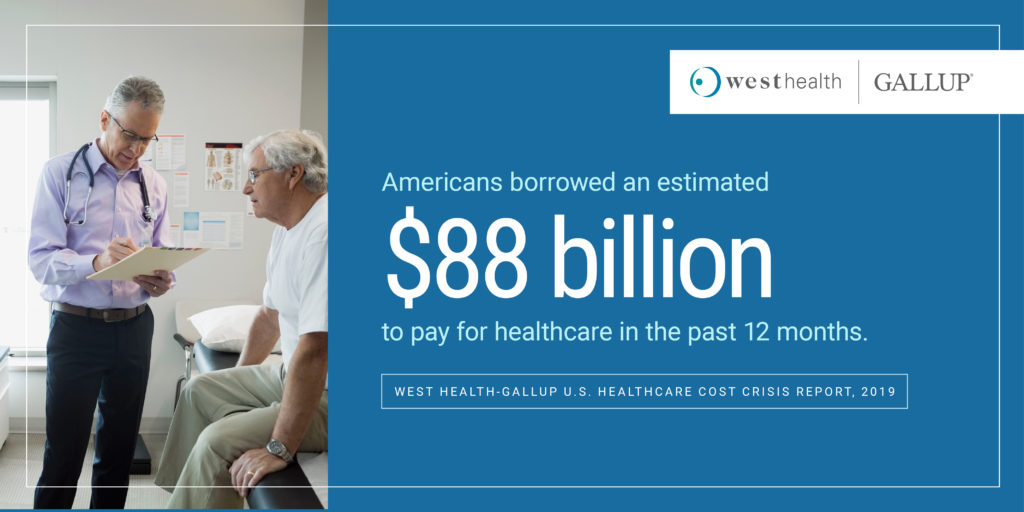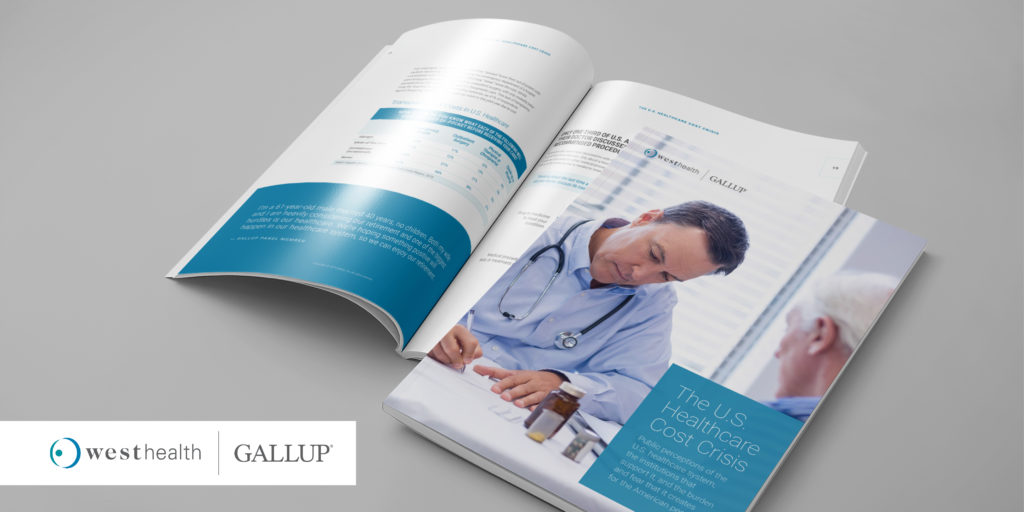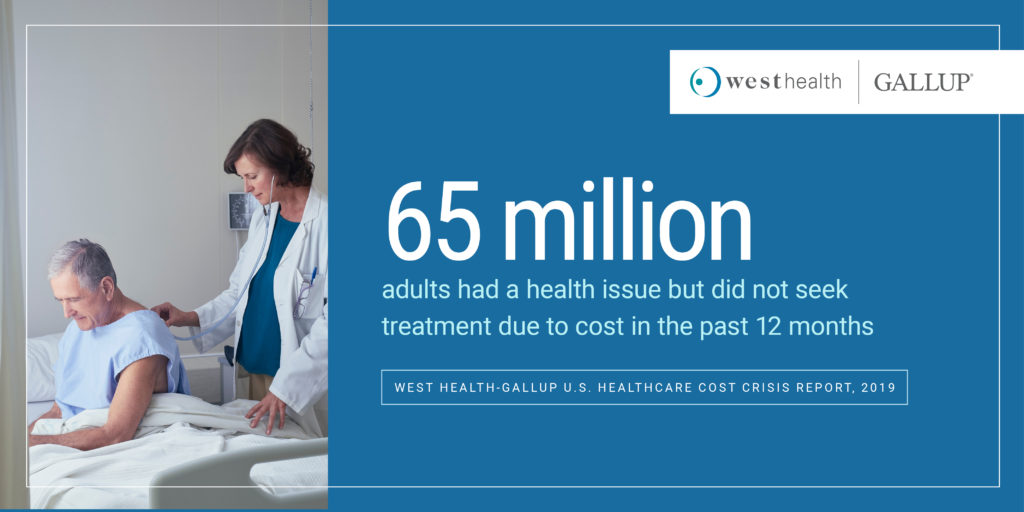
West Health-Gallup Survey Finds High Cost of Healthcare Causes Significant Worry, Financial Strain for Many Americans, but Political Party Affiliation Colors Views of System at Large
WASHINGTON, D.C. — April 2, 2019 — Americans are borrowing tens of billions of dollars, skipping treatments and significantly cutting back on household spending to pay for basic healthcare, yet a wide partisan divide exists over their satisfaction with the current U.S. healthcare system and the quality of care it provides. These findings and more are based on a new survey conducted by nonprofit, nonpartisan organization West Health and Gallup, the global analytics and advice firm.
The results were published today in a report titled The U.S. Healthcare Cost Crisis, based on a nationally representative survey of more than 3,500 American adults on the impact of the high cost of healthcare on personal finances, individual healthcare choices and the level of satisfaction with the U.S. healthcare system.
The survey found that despite 45% of respondents reporting fears of bankruptcy if a major health event strikes, 1 in 4 skipping a medical treatment due to costs and Americans collectively borrowing an estimated $88 billion to cover healthcare costs in the past year, most (64%) say they are “completely” or “mostly” satisfied with their personal experiences with the healthcare system. However, respondents’ satisfaction drops to 39% when they consider how well the system is serving Americans generally.
Assessments of the healthcare system are enhanced or diminished depending on party affiliation and whether the cost of care is considered. While nearly half (48%) of the general population believes that the quality of care in the U.S. is the best or among the best in the world, this swells to 67% of self-identified Republicans compared with just 38% of Democrats. Nonetheless, 76% of all Americans agree they pay too much relative to the quality of care they receive.
“While there may be a great political divide in how highly Republicans and Democrats perceive the healthcare system at large, there is very little that separates the groups when it comes to the real-life consequences of the high cost of healthcare on their everyday lives,” said Tim Lash, chief strategy officer for West Health. “The time has come to take politics out of the equation and deal with the realities of the healthcare cost crisis with bipartisan and common-sense solutions that serve all Americans.”
Pessimism about the government’s ability to address the crisis, however, is also bipartisan. Nearly equal majorities of Democrats (67%) and Republicans (70%) have no confidence in their elected officials’ ability to achieve consensus legislation to reduce costs. Overall, three-quarters of respondents — including 67% of Republicans — report that government is not currently doing enough to ensure that prescription drugs are affordable.
“The impact of out-of-control healthcare costs is indisputable, although Americans’ feelings about their healthcare system are complicated and at times conflicted,” said Dan Witters, Gallup senior researcher. “At a macro level, large numbers think healthcare in America is among the best in the world, but on an individual basis, most agree they are paying too much and getting too little in return, and they are worried not only for themselves but for the country.”
In 2017, the U.S. spent $3.5 trillion on healthcare — $10,739 per person — more than any other country, yet it consistently ranks near the bottom of major health indices among the 36 nations of the Organization for Economic Cooperation and Development.
Other key survey findings include:
- When given the choice between a freeze in healthcare costs for the next five years or a 10% increase in household income, 61% of Americans report that their preference is a freeze in costs.
- 77% of Americans are concerned rising costs will significantly damage the U.S. economy.
- 76% expect their costs for healthcare will increase even further in the next two years.
- 15 million Americans have deferred purchasing prescription drugs in the past year due to cost.
- Nearly 3 million borrowed $10,000 or more to pay for healthcare in the past year.
- Only about one-third report that doctors discuss costs with them in advance of procedures, tests or treatment plans, or for medicine required to treat their conditions.
The survey results will be announced at West Health’s 2019 Healthcare Costs Innovation Summit today in Washington, D.C.
The survey is available for download here: https://news.gallup.com/poll/248081/westhealth-gallup-us-healthcare-cost-crisis.aspx
About the Survey
Results are based on telephone interviews conducted Jan. 14-Feb. 20, 2019, with a random sample of 3,537 adults, aged 18 and older, living in all 50 U.S. states and the District of Columbia. For results based on the total sample of national adults, the margin of sampling error will range from +1.2 percentage points for response percentages near 10% to +2.1 percentage points for response percentages near 50%. All reported margins of sampling error include computed design effects due to weighting. The margin of error for subgroups such as gender, education level, income or political identity will be larger, typically ranging from around +3 to +5 percentage points.
The national sample included a quota of 80% cellphone respondents and 20% landline respondents, with additional minimum quotas within each U.S. subregion. Landline and cellular telephone numbers are selected using random-digit-dial methods.
About West Health
Solely funded by philanthropists Gary and Mary West, West Health is a family of nonprofit and nonpartisan organizations including the Gary and Mary West Foundation and Gary and Mary West Health Institute in San Diego, and the Gary and Mary West Health Policy Center in Washington, D.C. West Health is dedicated to lowering healthcare costs to enable seniors to successfully age in place with access to high-quality, affordable health and support services that preserve and protect their dignity, quality of life and independence. Learn more at westhealth.org and follow @westhealth.
About Gallup
Gallup delivers analytics and advice to help leaders and organizations solve their most pressing problems. Combining more than 80 years of experience with its global reach, Gallup knows more about the attitudes and behaviors of employees, customers, students and citizens than any other organization in the world.
MEDIA CONTACT:
Tim Ingersoll
Director of Communications, West Health
tpingersoll@westhealth.org
858.412.8727
MEDIA CONTACT:
Riley Brands
Strategic Communications Lead Gallup,
riley_brands@gallup.com
202.715.3106
PLEASE DOWNLOAD THE U.S. HEALTHCARE COST CRISIS REPORT ON GALLUP.COM



RELATED NEWS:
In America, it can cost $25,000 to get treated for strep throat MarketWatch
We’re Getting Old, but We’re Not Doing Anything About It New York Times
US unveils plan to import lower-priced drugs from Canada The Guardian
Grassley Speaks to Fiscal Responsibility of Prescription Drug Bill; Announces Updated Bill Coming Soon U.S. Senator Chuck Grassley
Kate Farley-Agee: The Best Workers’ Comp Networks Let Providers Be Providers WorkCompWire
Boston named top US hospital city, Raleigh dead last Healthcare Dive
Letters: U.S. healthcare is a hot mess Chicago Tribune
Is the crushing weight of medical debt America’s next financial crisis? Inland News Today
Bernie Sanders’ plan to eliminate medical debt, explained Vox
Bernie Sanders Introduces Plan to Cancel $81 Billion in Medical Debt Mother Jones
Follow these tips to avoid debt from medical bills Newsday
Sanders previews plan to cancel all past-due medical debt The Hill
Sanders Unveils Plan To Cancel $81 Billion Worth Of Existing Medical Debt Daily Caller
Sanders Plans to Pay Off $81 Billion Worth of Medical Debt, Doesn’t Share Where Money Will Come From Conservative Daily News
